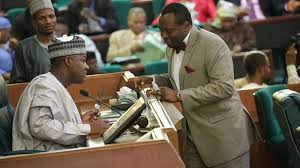News
FG Unveils N10m Interest-free Loan Scheme For Staff In Tertiary Institutions
The Federal Government has unveiled a ?10 million Tertiary Institutions Staff Support Fund (TISSF), designed to improve the welfare, career development, and financial stability of academic and non-academic staff in tertiary institutions.
The scheme, unveiled by the Minister of Education, Dr Tunji Alausa in Abuja on Thursday, is an interest-free loan.
The Tide source reports that the TISSF is a joint initiative of the Federal Ministry of Education and the Tertiary Education Trust Fund (TETFund), implemented in partnership with the Bank of Industry.
Alausa said the scheme was an intergral part of President Bola Tinubu’s Renewed Hope Reform Agenda for Education, which placed people at the centre of transforming the education sector and growing the economy.
“This programme is not just a welfare package.
“It is a strategic empowerment platform, designed to give our academic and non-academic staff the financial stability they need to serve our students with renewed dedication, and to live with dignity and pride.
“It is a zero per cent interest loan scheme aimed at enhancing welfare, supporting career development, and promoting financial independence for staff in Nigerian tertiary institutions,” he said
Alausa added that the scheme was put in place to address economic pressures and professional development gaps among tertiary staff.
He stated that studies had shown that over 70 per cent of tertiary institution staff in Nigeria had not participated in structured capacity-building programmes in the last five years.
He stated that TISSF aimed to change the situation, saying ‘’through the TISSF, beneficiaries will have access to finances for Medical Support like surgeries, emergency care, and medication.’’
According to him, there will be family and accommodation support such as rent, home ownership, renovation.
The minister also explained that beneficiaries would have access to transportation which included vehicle purchase (including EVs), bikes, tricycles, CNG conversions.
Other areas of intervention with the scheme include Small-Scale Enterprise and Agriculture in poultry, fishing, crop farming, and agro-processing.
Alausa added that academic advancement in the areas of professional certifications, degrees, and capacity-building programmes would be included in the scheme.
“The TISSF is open to confirmed full-time academic and non-academic staff of any federal university, polytechnic, or college of education and one state university, polytechnic, and college of education in each state.
” Applicants, who must have at least five years to retirement, membership of relevant staff associations such as ASUU, NASU, COEASU, and SSANIP are required.’’
The minister said that the development had translated to 248 eligible institutions nationwide, covering all federal tertiary institutions and selected state-owned ones.
He added that each eligible staff member could access up to ?10 million, subject to a cap of 33.3 per cent of their gross annual salary.
He noted that the interest-free loans would be repayable over five years, with 12 months moratorium before repayment begins and invited the eligible to commence application for the programme.
Alausa explained that the applications would be processed through an easy-to-use online platform, www.tissf.boi.ng.,
He urged the staff to fill out the form, undergo identity verification, and have their requests vetted by the Bank of Industry.
“The opportunity is here to improve your welfare, advance your career, and strengthen our institutions.
‘’Let us seize this moment for our personal growth, for the stability of our institutions, and for the future of Nigeria’s education sector,” Alausa said.
Also speaking, the Managing Director, Bank of Industry, Dr Olasupo Olusi, said the process had been fully automated, assuring transparency in the implementation.
The Chairman, House committee on University Education, Abubakar Fulata, while commending the government for the programme, decried the low standard of living of university staff.
Fulata recommended a minimum of N1million as salary for a graduate staff in the tertiary institutions.
The representative of the non-academic staff union, Abubakar Aliyu pledged support for the initiative.
Aliyu, however, called on the federal government to pay all outstanding arrears as the payments would enable the staff to repay the loan.
The Chairman of Committee of Vice Chancellors of Federal Universities, Prof. Tanko Ishaya, also pledged support for the initiative and called for its continuity.
News
Ajaokuta Spends N1bn Annually In pensions, salaries – Prof. Asuquo
The non functional Ajaokuta Steel Company Limited (ASCL) is costing the country more than N1 billion annually in pensions, salaries, taxes, and administrative costs.
Prof. Linus Asuquo, Director-General (D-G) of the National Metallurgical Development Centre, Jos, stated this in his presentation at a panel discussion at the maiden edition of the National Steel Summit on Thursday in Abuja.
The discussion was titled “Dissecting the Current Policy Framework: Identifying Gaps and Building a Robust Institutional Regulation”.
The Tide source recalls that, according to a 2024 report by BudgIT’s accountability platform, Ajaokuta’s financial burden has continued to grow, with about ?1.11 billion spent in the past two years.
The D-G listed the challenges of the steel company to include a huge financial burden, mismanagement, corruption, and a disconnected value chain infrastructure.
According to him, Nigeria has invested over eight billion U.S. dollars in the Ajaokuta project over a period of more than 40 years.
He said that persistent mismanagement and policy failures derailed the project, as funds were misappropriated and concessionaire deals failed, citing the Japanese Kob Steel and India-based Global Steel Holdings Limited (GSHL) as examples.
Asuquo explained that the ASCL was burdened with a disconnected value chain infrastructure, as the iron ore mines at the National Iron Ore Mining Company (NIOMCO) in Itakpe, Kogi, remained non-operational.
“Rail line for transporting ore from Itakpe to Ajaokuta was delayed, vandalised, it was only completed and inaugurated in 2020.
“Obsolete technology and degraded equipment because most of the installed machinery has degraded over decades and the plant lacks modern energy efficient steel making technologies.”
He also noted that local community displacement remains unresolved as 13 villages were displaced when the plant was built.
According to Prof. Asuquo, the way forward is to rebuild the integrated supply chain and adopt modern mini-mill technologies.
He recommended shifting from large-scale blast furnaces to compact strip production (CSP), a cheaper, more energy-efficient technology that can be built and made operational more quickly.
Other recommendations he made included adopting private sector concessions, which entailed a complete shift from government management to strategic private investors with proven expertise.
“The way forward includes-manufacturing and pulsed revival of the plant, community and civil society engagement through (ESIA) Environmental and Social Impact Assessment.
“It (ASCL) can be used as an industrial park and free trade zone,“ he said.
He noted that Nigeria’s key legacy steel assets were mostly underutilised and equipped with obsolete machinery, stating that revitalising them required policy and institutional reforms alongside strategic public-private partnerships.
The D-G listed other measures to include infrastructure and energy improvements; research, development and innovation; human capital development; raw materials exploration and processing; and sustainable financing mechanisms.
“Revitalising Nigeria’s legacy steel assets is a national imperative. With political will, coherent policies, private sector collaboration, and sustained investment, the steel sector can become a key driver of industrialisation and economic transformation,“ he said.
The theme of the summit is Rebuilding and Consolidating Nigeria’s Steel Industry: Collaborative Action for Sustainable Growth and Global Competitiveness.
News
Third Mainland Bridge Is Safe -Ministry

The Federal Ministry of Power, Works and Housing, yesterday said that the Third Mainland Bridge in Lagos was safe for use, contrary to a Facebook posting spreading fears about the bridge.
The Ministry in a statement attached a video of ongoing under water confirmatory tests on the bridge’s piles.
The statement, signed by Special Adviser, Communications, to the Minister of Power, Works and Housing, Mr Hakeem Bello, added that the expansion joints being speculated to be dangerous was among those slated for repairs.
“The General Public is hereby informed that the expansion joint shown in a Facebook video clip, is one of those slated for change during repairs on the Third Mainland Bridge which will commence soon.
“It is still functioning and our engineers and consultants have advised that it does not pose any structural danger to the bridge and it is safe for use.
“Commuters and Lagos residents will recall that the Third Mainland Bridge was shut down for a 3-day Investigative Maintenance in August 2018.
“Tests done on the expansion joints then — called static and dynamic load tests — were to check functionality. A number of expansion joints were identified for replacement then.
“More recently, in March this year, underwater confirmatory tests (video attached) preceding the repair works to be done on the Bridge, were carried out on the piles to determine if there is further deterioration or not on the piles from that done in 2013.
“However, all the tests done preparatory to closure of the Bridge to commence comprehensive Maintenance works indicate that the integrity of the Bridge is intact.
“Therefore, the Third Mainland Bridge is safe for use, and people should desist from spreading or sharing false information about the Bridge on Social Media platforms.
“The expansion joints to be replaced are part of a regular bridge maintenance programme that has been neglected for decades, which the President Muhammadu Buhari administration is now addressing frontally, on many bridges nationwide.
News
Bishop Appeal For FG’s Intervention Over Disputed Boundries, lands

The Anglican Bishop of Abakaliki Diocese has called on the federal government to intervene over land and boundary disputes amongst Ebonyi, Benue and Cross River states and take over such where disputes persist.
The Rt. Rev. Monday Nkwoagu of the Diocese said that displacement of communities and families occasioning hardship in the aforementioned areas had been on the rise and something needed to be done about it.
Nkwoagu, who was delivering an Easter message yesterday in Abakaliki, advised all warring communities and states to come together and resolve their differences through dialogue.
The cleric also urged the federal government to engage them in dialogue to resolve the issues for peace sake.
“Most rural dwellers are now displaced, and things are very difficult for them. One cannot even visit those areas freely.
“I plead to authorities responsible for quick response as lives and property worth millions had been lost to land disputes and may continue if not handled, “ the bishop said.
He reiterated that where solution to the disputes could not be easily found the federal government should take over and forestall further skirmishes.
Nkwoagu urged the communities and states to reflect on the death and resurrection of Jesus Christ which brought forgiveness and recognition so they could move forward.
“We should try and bury our prides, learn from Christ’s humility and sacrifice for the sake of peace and lives.
-

 Politics4 days ago
Politics4 days ago2027: Nigerians Victims Of Desperate Politicians – Cleric
-

 Business4 days ago
Business4 days agoCBN Comptroller Warns Against Naira Sale
-

 Politics4 days ago
Politics4 days agoObasanjo, Tinubu Mourn Audu Ogbeh’s Death @78
-

 Politics4 days ago
Politics4 days ago2027: APC Woos Enugu Gov
-

 Maritime4 days ago
Maritime4 days agoMWUN, Police Parner In Safer Port Operations
-

 Business4 days ago
Business4 days agoReal Estate GDP Contribution Surges To N41.3tn
-

 Business4 days ago
Business4 days agoFreight Forwarders Raise Alarm Over Govt Reforms Sabotage
-

 Niger Delta4 days ago
Niger Delta4 days agoC’River Communities Seeks Govt Intervention In Humanitarian Crisis

